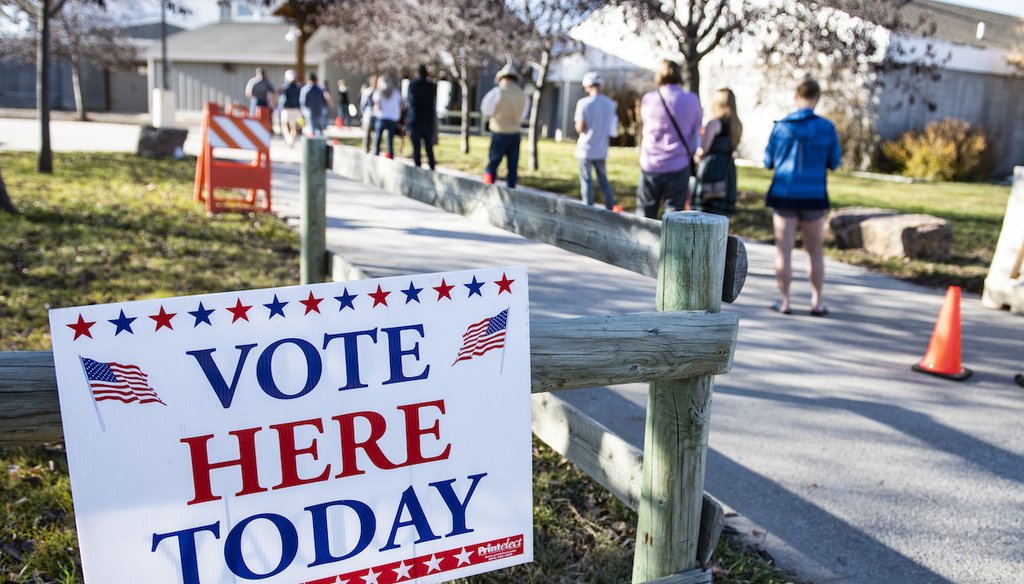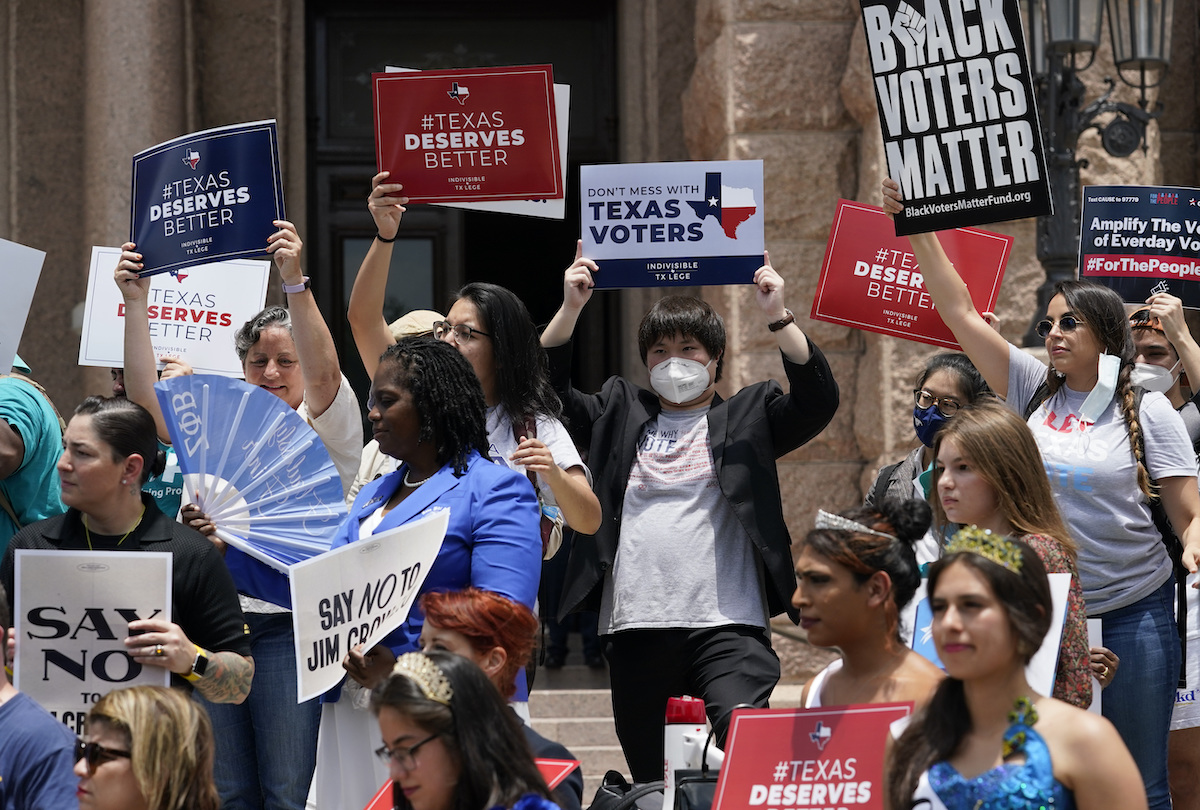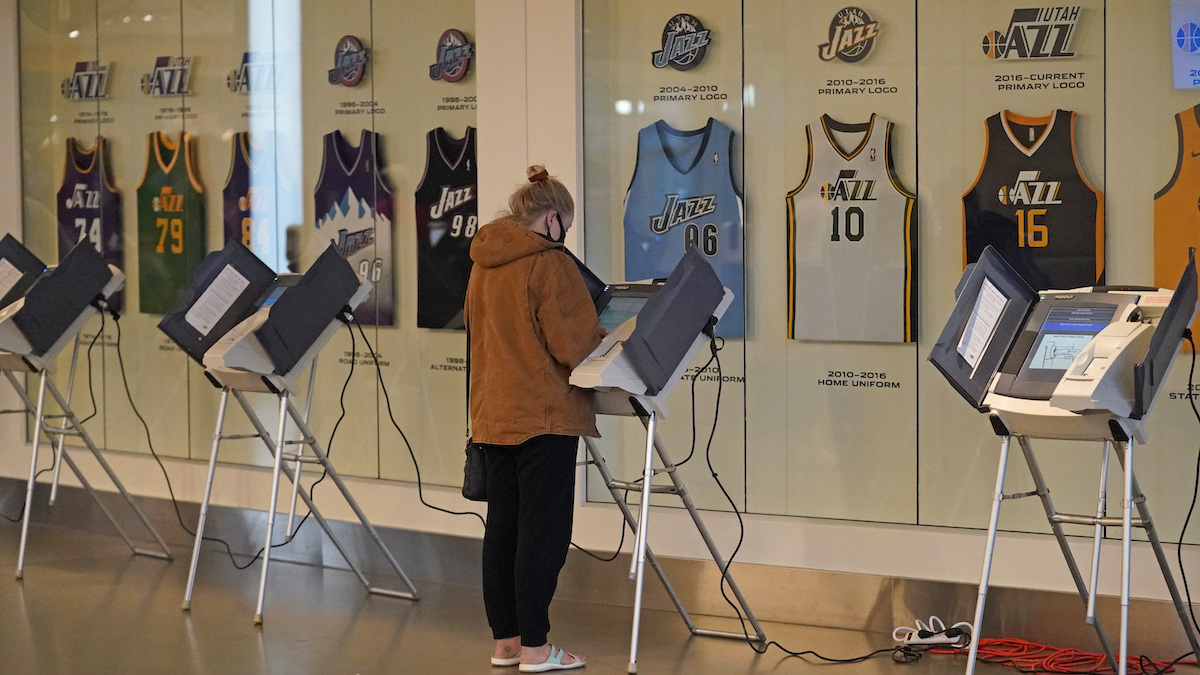Stand up for the facts!
Our only agenda is to publish the truth so you can be an informed participant in democracy.
We need your help.
I would like to contribute

Patrons of the Gallatin County Fairgrounds wait in line to cast their ballots in Bozeman, Mont., on Nov. 3, 2020. (AP)
If Your Time is short
• Joe Biden and other Democrats have sought to rally opposition to restrictive election laws by saying that 17 states have enacted 28 new laws “to make it harder for Americans to vote.”
• Our analysis suggests that about two-thirds of these laws did enact restrictions that are noticeably tighter than the practices used in 2020.
• However, about a quarter of the laws would have only a speculative impact on voting access, and a few of the laws included expansions of voting policies along with the more restrictive provisions.
As President Joe Biden seeks to enact national voting rights legislation, he has turned his attention to attacking new state laws that he says will restrict voting.
"This year alone, 17 states have enacted — not just proposed, but enacted — 28 new laws to make it harder for Americans to vote," Biden said during a July 13 speech in Philadelphia on voting rights.
Biden was referring to a mid-June list of 28 election-related laws that the left-leaning Brennan Center for Justice at New York University says "restrict access to the vote."
Many other Democrats have repeated this talking point, including Vice President Kamala Harris and Sen. Amy Klobuchar, D-Minn., who is taking her committee’s voting rights hearings on the road, starting in Georgia.
Supporters of new voting laws at the state level say the changes will help protect the integrity of future elections. Jason Snead, who heads the conservative Honest Elections Project, said he rejects the argument that the lack of widespread voter fraud made these new laws unnecessary.
"It’s like arguing you shouldn’t lock the front door until after you are robbed," Snead said.
But critics counter that Republicans are crafting rules to give themselves an edge in winning elections.
Often, laws that make it harder to vote tend to burden voters of color and others who already face challenges to voting, including students, rural residents and older people, said Eliza Sweren-Becker, a Brennan Center lawyer.
For example, she said that a new law in Montana that bans paid ballot collection will make it harder for Native Americans who have relied on paid organizers to shuttle their ballots because they live far from polling places.
"We are not suggesting each of the restrictive laws is equally restrictive," Sweren-Becker said. "Some policies make it a little harder to vote, some policies make it a lot harder to vote."
Democrats have a point when they say that Republican state lawmakers have proposed new voting laws in response to Biden’s win. And Donald Trump and his allies have perpetuated falsehoods about voter fraud and election rigging.
But how accurate is the Democratic talking point about the 28 restrictive laws?
Ultimately, we found that the number 28 is somewhat exaggerated, because it lumps together laws with a significant and noticeable impact for voters’ ability to cast ballots with laws where the impact is more limited or speculative. But Democrats are right that voting rights are being restricted in many cases.
We looked at the language of all of the newly enacted laws on Brennan’s "restrictive" list, tracked the news coverage about them, and followed up with election officials and voting experts. Our aim was to gauge whether there were differences in the severity of those 28 laws.
For the purposes of our analysis, we asked ourselves this question: Would the new law make it harder for a voter to cast a ballot in their state in 2022, compared with 2020? We did not judge how the new law compared with voting laws in other states; we simply looked at which direction the law went.
All told, we found that about two-thirds of the new laws made changes that can be considered significant restrictions for voters. Another quarter of the laws made changes where a restrictive impact is conceivable but more speculative. And a few of the laws included some restrictive elements, but also included separate provisions that made voting easier.
The Brennan Center says the final number of laws it considers restrictive could rise as state legislatures complete their sessions. One possibility is Texas, where consideration of a GOP-backed bill was blocked by Democrats leaving the state to deny a quorum. Meanwhile, the Democratic talking point also ignores Brennan’s separate tally of new expansive voting laws that increase early voting, extend dropbox access or make other changes that are favorable to voters.
"The nuance matters, even when characterizing laws that on their face seem to make it harder to vote," said Matthew Weil, an elections expert at the Bipartisan Policy Center.
Franita Tolson, a University of Southern California law professor, agreed. "We no longer live in the time of poll taxes and literacy tests," Tolson said. "It's way more subtle now."
Here’s our breakdown of the 28 laws, starting with the group of the most restrictive.
Demonstrators join a rally to protest proposed voting bills on the steps of the Texas Capitol, July 13, 2021, in Austin, Texas. (AP)
Laws with significant changes for voters
Some of the highest-profile voting laws restricted voting access.
Georgia passed one law amid significant controversy, costing the state the Major League Baseball All-Star Game. The legislation (S.B. 202) is a mixed bag of provisions. For instance, it modestly expands the state’s early-voting period, but rolls back voting rights in other ways.
Voters applying for absentee ballots must provide the number of their Georgia driver's license, state ID or another form of identification. The Atlanta Journal-Constitution found that about 56% of voters who lack a driver’s license or state ID are Black, and most live in large, urban, Democratic-leaning counties.
The bill also limits the number of ballot drop boxes and when voters can use them. And it expressly bans handing out food and water to voters in line. Some Georgia voters in 2020 waited more than five hours in line to vote on the first day of early voting.
Florida passed a law (S.B. 90) that adds restrictions to voting by mail. The new law says that, except for secure drop boxes at an election supervisor’s office, a drop box may be used only during early voting.
Meanwhile, instead of being able to request a mail ballot through the next two general elections, voters will be limited to requesting ballots only through the next general election. The law also limits how many mail ballots a person can deliver, an effort to crack down on the practice critics call "ballot harvesting."
Iowa passed legislation that made substantial changes. One law (S.F. 413) enforced a shorter early voting period (from 29 days to 20 days), imposed an earlier due date for absentee ballots, and restricted how many drop boxes a county can have. A separate bill (S.F. 568) added restrictions for who can return ballots on behalf of voters with disabilities. Both Iowa laws have drawn lawsuits.
While national attention has focused on a Texas election bill under consideration, the state has already passed one measure (H.B. 3920) that limits the situations under which someone is allowed to vote early by mail on the grounds of disability. Another new law (S.B. 1111) makes several changes, including adding extra steps to confirm a voter’s address if they use a commercial post office box. Civil rights groups have filed a lawsuit challenging that law, arguing that it also restricts registration opportunities for Texans who have temporarily relocated, such as college students.
Lesser-known laws in other states have also restricted voting access to varying degrees.
Kansas’ Republican-controlled Legislature enacted two election-related bills, overriding vetoes by Democratic Gov. Laura Kelly. Both have drawn legal challenges from voter advocacy groups; those suits are pending.
One law (H.B. 2183) created the crime of "false representation of an election official." Voting advocacy groups argue that the legislative text is written so vaguely that the provision could chill ordinary voter registration outreach. Already, the League of Women Voters and Loud Light have said they will stop registering voters for fear of being prosecuted under the new law.
The second law (H.B. 2332) effectively prevented out-of-state groups from mailing absentee ballot applications to voters by requiring groups to pay a fee of $20 per application sent, a price tag that critics describe as "crippling."
In Arizona, a new law (S.B. 1485) removes voters from a permanent early-voting list if the voter fails to vote an early ballot in all elections for two consecutive cycles. Election officials will send such voters a notice asking if they want to remain on the list, and if they don’t respond they will be removed. About 75% of Arizona voters were on the early-voting list in November.
And in Alabama, voters must now mail a request for an absentee ballot no later than seven days before an election, compared with five days under the previous law.
Other laws on the Brennan Center list that we have characterized as making a "significant" change are from Arkansas (Act 249 and Act 973); Montana (H.B. 176, S.B. 196, S.B. 169, H.B. 530); and Wyoming (Act 72).
A woman votes at the Vivint Smart Home Arena, Nov. 3, 2020, in Salt Lake City. (AP)
Laws where the impact on voters is more speculative
Other laws made very narrow changes or did them in a way that may not lead to lost voting rights.
For instance, two state laws — Louisiana’s H.B. 167 and Utah’s H.B. 12 — set new deadlines and processes for removing the names of deceased voters from the rolls. It’s unclear how many voters, if any, will be erroneously removed as a result.
In Alabama, H.B. 285 banned any type of curbside or drive-through voting. But since the state has never allowed that practice in the first place, it did not roll back rights that already existed. Arkansas (Act 736) and Idaho (H.B. 290) enacted legislation to clarify the rules for signature matching, which is used in most states to confirm that absentee ballot applications and the ballots themselves are legitimate. The new law didn’t impose new restrictions but rather moved to clarify the steps to follow.
Arizona (S.B. 1003) set a new deadline for fixing missing signatures on mail ballots, an issue the law was previously silent on. The new law codified the practice used in 2020. Meanwhile, any restrictive effect from Nevada’s law (S.B. 84) lifting the cap on voters per precinct will likely be balanced out by a different law signed by Gov. Steve Sisolak that requires election officials to send mail ballots to all active voters, while allowing voters to opt out of receiving a mail ballot and cast a ballot in person instead.
Laws that included both restrictive and expansive provisions
Our final category consists of laws that roughly balance restrictive and expansive provisions on voting rights.
In Indiana, S.B. 398 limited drop box use to hours when an election office is open, which would make them a less convenient option for people who have trouble taking time off from work. At the same time, the bill made it easier for people with disabilities to register and request absentee ballots electronically. And another Indiana law (H.B. 1479) expanded early voting by allowing a third Saturday for voting prior to Election Day.
In Oklahoma, H.B. 2663 significantly shortened the window for requesting absentee ballots. But the legislation also added an extra day of early voting for presidential elections.
Finally, Kentucky passed a broad law (H.B. 574) with the support of the Republican-controlled legislature and Democratic Gov. Andy Beshear. The law made the Brennan Center list of restrictive laws because it shortened the window to apply for a mail ballot and banned collecting and delivering absentee ballots, with some exceptions.
However, the bill also included several elements that voting advocates cheered. It established three days of in-person voting, which hadn’t been offered prior to 2020; it established a process for voters to "cure" absentee ballots if election officials spot an error, such as a missing signature; it made permanent an online portal for requesting absentee ballots; it allowed counties to establish voting centers that can be used by voters from any precinct; and it allowed the use of ballot drop boxes.
Editor's note, July 26: The Brennan Center for Justice issued this response to our story after publication. Our analysis has not changed.
RELATED: All of our fact-checks about elections
RELATED: Iowa’s newest election laws, explained
RELATED: What’s in Georgia’s new voting law that lost it the All-Star Game
Our Sources
White House, Remarks by President Biden on Protecting the Sacred, Constitutional Right to Vote, July 13, 2021
Brennan Center for Justice, Voting Laws Roundup: May 2021 (includes June 21, 2021 update)
Email interview with Chad Houck, chief deputy secretary of state for Idaho, July 19, 2021
Email interview with Justin Lee, director of elections in the office of the Utah lieutenant governor, July 16 and 20, 2021
Email interview with Jason Snead, Honest Elections Project executive director, July 20, 2021
Email interview with Eliza Sweren-Becker, counsel in the Democracy Program at the Brennan Center for Justice, July 20, 2021
Email interview with Matthew Weil, director of the Elections Project at the Bipartisan Policy Center, July 19, 2021
Email interview with David J. Becker, executive director of the Center for Election Innovation & Research, July 19, 2021
Email interview with Franita Tolson, Vice Dean for Faculty and Academic Affairs and Professor of Law at University of Southern California Gould School of Law, July 20, 2021
Email interview with Trey Grayson, former Kentucky Secretary of state and former president of the National Association of Secretaries of State and current managing director of CivicPoint, July 20, 2021
Email interview with Andrew Bates, White House spokesperson, July 13, 2021
All other sources linked in article

























































